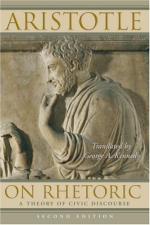
|
| Name: _________________________ | Period: ___________________ |
This quiz consists of 5 multiple choice and 5 short answer questions through Book III, Chapter 10-12.
Multiple Choice Questions
1. As both illustrations and fables utilized imagery to make a point, what type of imagery did Aristotle think fables used?
(a) Realistic.
(b) Relevant.
(c) Fantastic.
(d) Irrelevant.
2. In Aristotle's opinion, what did simple words convey?
(a) What people do not already know.
(b) What people do not want to know.
(c) What people already know.
(d) What people want to know.
3. As explained in Book I, Chapter 10, what did the general law refer to?
(a) Written laws of necessity.
(b) Unwritten laws of justice.
(c) Unwritten laws of necessity.
(d) Written laws of justice.
4. What was another word used for "legal" in Aristotle's discussion of legal rhetoric?
(a) Political.
(b) Lawful.
(c) Forensic.
(d) Civil.
5. How did Aristotle define "the good"?
(a) That which is sought for the well being of an individual.
(b) That which is sought for its own sake.
(c) That which is sought for the well being of the country.
(d) That which is sought for another's sake.
Short Answer Questions
1. Which one of the following was not included by Aristotle as a cause for the feeling of calmness?
2. As explained by Aristotle, what comprised good?
3. How did Aristotle differentiate between crime and punishment?
4. Which one of the following was not included by Aristotle in his description of young people?
5. In addition to context, what type of application of rhetoric did Aristotle think should determine the style?
|
This section contains 287 words (approx. 1 page at 300 words per page) |

|




